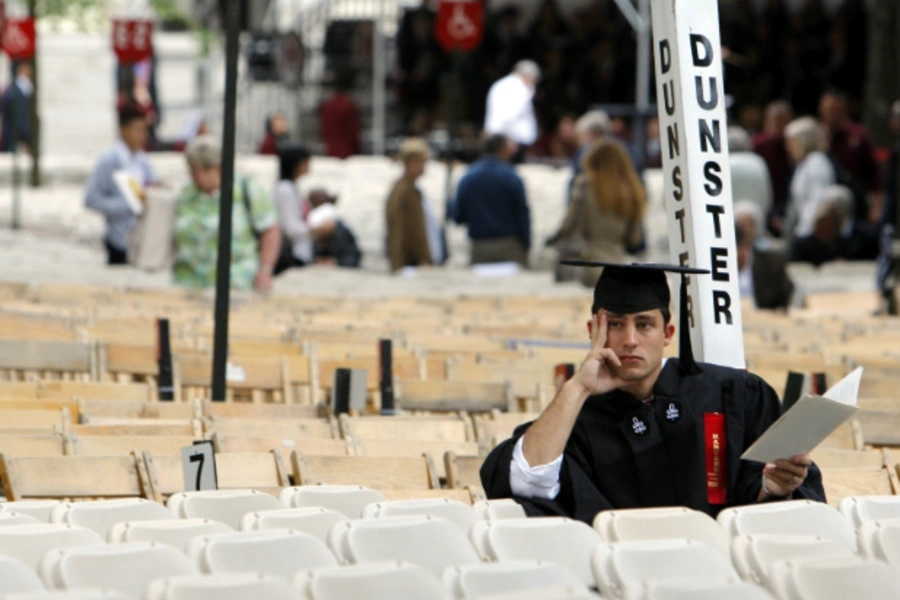Morning Brief: U.S. College Attendance Falling Behind

More on:
The United States continues to fall behind in college education (WSJ). Thirty years ago, over 40 percent of U.S. twenty-five to thirty-four-year-olds had a college degree, the highest proportion in the world. The U.S. percentage has not grown, but fourteen other nations have surpassed it. Economists believe this relative underinvestment in American minds will weaken growth in high-wage jobs and living standards.
As one expert put it: "The wealth of nations is no longer in resources. It's no longer in physical capital. It's in human capital." Experts point to numerous reasons for the slowdown: an underperforming K-12 system with high dropout rates, rising college tuition, and declining confidence in the value of a four-year degree.
Early Algebra Harms Low Performing Students
Recent studies suggest that exposing low performing math student to algebra during middle schools mars later math performance (Education Week). For math students in the bottom 20 percent on sixth-grade exams, taking algebra in middle school made them 46 percent less likely to pass algebra one by tenth grade than their peers who waited until high school. Experts suspect that poor academic preparation rather than developmental readiness is the culprit; schools in Japan have successfully integrated algebra into early elementary school.
The new report of the CFR Independent Task Force on U.S. Education Reform and National Security highlights the importance of the Common Core State Standards and asserts that fixing the nation’s underperforming K-12 schools is critical to economic competitiveness and national security.
Education and human capital. Read more from experts discussing ways to improve U.S. education and immigration policies.
International Trade and Investment
U.S.-India Relations Face Challenges
The Financial Times argues recent U.S.-India trade disputes show the expectations of a budding relationship were unrealistic in the wake of the 2008 nuclear deal. Mutual frustration has grown. Stalling Indian reforms and a recent proposal to retroactively tax international deals have frustrated Washington, while Delhi perceives a lack of U.S. support for IMF reform. While bilateral trade continues to grow, both countries recently filed WTO cases on import duties and bans. U.S. restrictions on work visas are another sticking point India prepares to bring to the WTO.
International trade and investment. Read more from leading analysts on the debate over next steps in U.S. trade policy.
Innovation
Tech Startups Pivot to Success
Today’s leading mobile and web entrepreneurs often succeed not by deploying a well matured idea, but by quickly cycling through different ideas (WSJ). The ability to quickly make strategic pivots based on user feedback until a winning concept is found helped Instagram’s founders turn a virtual check-in site into a billion dollar mobile photo sharing service. A leading venture capitalist offered: "[Pivoting] represents some of the best methodology that the Valley has invented. Starting something, determining it's not working, and then leveraging aspects of [that] technology is extremely powerful."
Innovation. Read more on how the U.S. capacity to innovate could play a chief role in economic growth.
Corporate Regulation and Taxation
Accessing Tax Court
Reuters describes the relative difficulty in getting documentation from the U.S. Tax Court. The court’s rulings set precedents that shape tax law and greatly influence corporate and personal decisions, but its wide influence contrasts with its limited accessibility. Unlike district, appellate, and bankruptcy courts, documents filed in proceedings of the Tax Court are not available online. While outside experts press for increased transparency, the court argues it has a duty to protect the confidentiality of personal tax records as it expands access.
Corporate regulation and taxation. Read more from top economists and business experts on solutions for addressing corporate tax reform.
The Morning Brief is compiled by Renewing America contributor Steven J. Markovich.
More on:
 Online Store
Online Store
